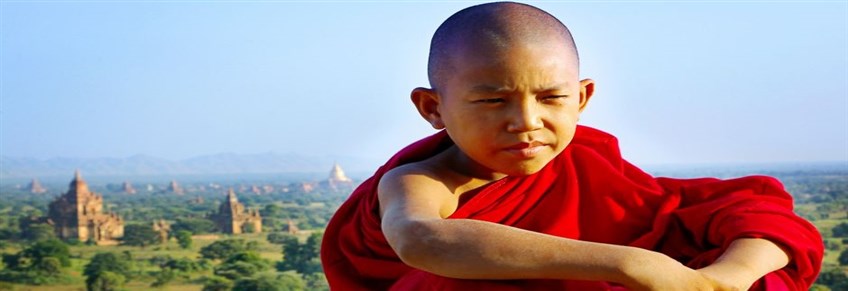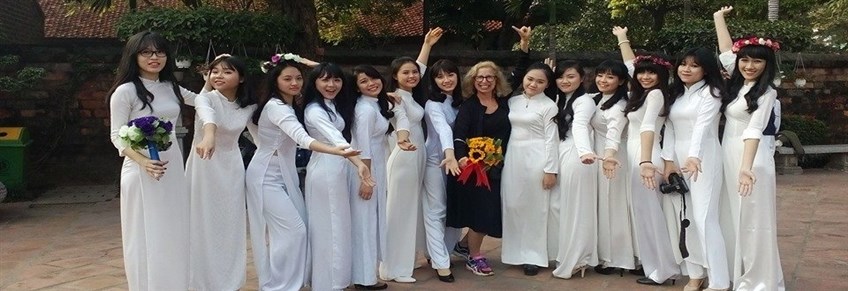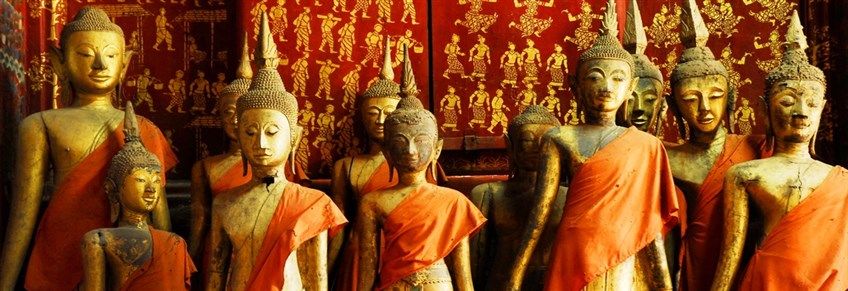
Until fairly recently Myanmar (formerly Burma) was closed for business; few foreign visitors considered the Country as a tourist destination and the governing regime showed no signs that it was worried about that. It is a country with a colorful colonial past, full of its own historical, religious and cultural attractions with plenty to offer inquisitive visitors. Myanmar tours are now firmly on the tourist map and this Myanmar Travel Guide will give you an idea of the Country and the expectations that its people will have of overseas visitors.
It is a country whose inhabitants are a mix of the cultures nearby, the nations that occupied it at different times through the ages, and the countries that it conquered at other times. Indians and Chinese mixed with local tribes forming a nation that was strong enough to invade Siam (now Thailand) before being colonized by the British who ran it as a province of India until 1937. It was a center of activity during World War II and was then granted independence from Britain just after peace prevailed. For most of the time since it was been ruled by the Army with any democratically elected government quickly removed.
It is just in the last few years that the stance has softened, largely because of the sanctions that have been in place for years. Those wishing to see what Myanmar has to offer are at the forefront of people wanting a new experience enjoying the riches the country has on offer.
When Is the Best Time to Visit?
Hot, wet and cool are as a good a description as any for the three seasons in Myanmar.
• Hot is early March until the end of May. If you are visiting the Country during these weeks you should have suitable lightweight clothing mindful that shorts and T shirts will not be acceptable at religious sites.
• Wet follows and lasts until mid-October so lightweight waterproofs are a good idea.
• Cool then starts until the end of February but cool is a relative expression. The cool season is certainly favored as opposed to the hot season because it can be very hot indeed and sometimes uncomfortable and not the best for Myanmar tours.
Customs Regulations
There are the usual duty free allowances but visitors must declare cameras, electrical goods and jewelry to customs. It is certainly not permissible to take out valuables, antiques or anything of cultural significance.
Drugs are to be avoided completely other than those that tourists need to carry for their personal use and have documentation and prescriptions to support that.
Language
Burmese is the official language though it will be called Myanmar by the authorities. The Government changed the country’s name in 1989 but it was not recognized across a wide number of countries.
The language is Sino-Tibetan based, a result of the mass invasion of people from that region many centuries ago.
There are ethnic groups speaking their own language and around Mandalay there are plenty of people speaking Mandarin. You can expect so see signage which includes English, certainly in cities and all the major tourist areas. English is the second language despite the diversity within Myanmar.
That does not mean that it does not make sense to have a phrasebook with you at all times.
Tourist guides are likely to be available who speak other languages; Japanese, Hindi, Mandarin and Thai particularly. If you are on a good organized tour then you will encounter few problems.

Currency
The Kyat is sub-divided into 100 pyas. There are some coins but the largest has such small value that they are gradually fading from use. The currency is not convertible so you need to spend all you have if you are on a Myanmar holidaybefore departure.
US Dollar currency is the easiest to change though it has to be remembered that damaged notes may not be acceptable. Prices are regularly quoted in US dollars in tourist areas, hotels and restaurants because of the fluctuation in exchange rate. The approximate rate is 1,200 to the US$.
Credit cards can be used be the charges can be very high indeed and their use in hotels, restaurants and shops is not really advisable. Their use is increasing but Myanmar remains largely a cash economy at present.
Travelers’ checks are not an acceptable way to carry your money; there is no legitimate way to exchange them in Myanmar. Occasionally a money changer may take them if he or she has a means of cashing them elsewhere but the commission charged will be very high. It is simply not worth bringing them to Myanmar though those touring other countries in the region as well may want them for use elsewhere.
There is a black market in currency exchange but it is wise to steer clear of this completely.It could lead to not only visitors losing their money but also trouble with the authorities.
Bargaining
Tourists are likely to find that they are charged more than the locals for the same goods and services. It is often futile to try to negotiate for a cheaper rate in a hotel for example and some literature actually has two prices. If you are happy with street food you will however get value.
You may want to try products in tourist areas and there may be some room to maneuver.
Myanmar has a reputation for lovely lacquerware, antiques, tapestries, woven textiles and precious stones. There is an increasing trade in sub-standard or fake products so beware. You should also remember that you will not be allowed to take genuine antiques out of the country without express written permission, and that is not from the seller.
Working
Government offices and agencies will open 0900 to 1630 Monday to Friday though airlines will open on Saturday and Sunday morning until 1200 for reservations. Post Offices may sometimes open on Saturday mornings but you can be guaranteed Monday to Friday until 1630.
Private offices work fairly long hours, until 1700 Nonday to Friday then morning, Saturday and Sunday until 1200.
Shops are likely to be open 7 days a week, on average 0900 until 1700.

Public Holidays
When you are reading this Myanmar Travel Guide you should try to remember some significant dates where some facilities may be closed. Certainly you can expect government offices and banks to be closed. Those that revolve around the Buddhist religion vary from year to year depending on the astronomical calendar.
1 January: Kayin New Year
4 January: Independence Day
12 February: Union Day
2 March: Peasants Day
4 March: Full Moon Day of Tabaung
27 March: Armed Forces’ Day
12 April - 21 April: New Year Holidays incorporating Thingyan Water Festival (12th – 16th) and actual New Year’s Day, the 17th.
1 May: International Labor Day
2 May: Kason Watering Festival - Full Moon Day of Kason
19 July: Martyr's Day
31 July: Dhammasakyar Day - Full Moon Day of Second Waso
28 October: Abhidhamma Day - Full Moon Day of Thadingyut
26 November: Tazaungdine Festival - Full Moon Day of Tazaungmone
6 December: National Day
25 December: Christmas Day and Kayin New Year Day
Myanmar Visas
There is an E visa service but only for a single entry visa through Myanmar’s Airports, not border crossings or sea ports. The visa is valid for 90 days with tourists able to stay for 28 days once they have entered Myanmar. Visas on arrival have resumed at airports and it is important that people considering a Myanmar holiday check the details that are in place before they depart for the Country because there is a certain amount of confusion on the actual policy in place.
Dos and Don’ts
In common with all the countries in this part of the world, the important thing to remember in order to enjoy a Myanmar holiday is to show respect to its religion, culture and to the people themselves.
Do
• Dress modestly, especially at religious sites such as monasteries and pagodas
• Allow the oldest to be served first
• Always show respect to monks, nuns and novices
• Offer and receive items with both hands
• Bow slightly when passing in front of your elders
• Be careful not to offend when taking a photograph
• Tip directly anyone who you feel deserves it; it will go to the right person that way
Don’t
• Sit with your back to an image of Buddha
• Handle a Buddha image without respect
• Touch a monk if you are female
• Step on the shadow of a monk
• Touch anyone on the head
• Allow your feet to be in any prominent position
• Point at people, especially directly at their faces
• Take part in gambling
• Discuss politics or religion even in a positive way
• Drink bottled water or accept ice in a drink in a place where you are uncertain about the origin of the water

Safety
It is worth considering health safety. Tourism has only begun to develop recently so visitors are advised to have good quality insurance in place before arrival. Tourists coming from certain countries in recent days will need evidence of cholera immunization. All need vaccination for Hepatitis A, polio and typhoid fever while tourists should be taking malaria medication. It is worth carrying a basic medical kit and prescription drugs if needed. Hygiene is not great and you need to bear that in mind when eating and drinking.
Myanmar is a strict Buddhist country and that certainly helps to make it one of the safest countries in the world; it is in the culture and the penalties for locals targeting tourists are severe. That does not mean that those enjoying a Myanmar holidayshould forget some basic principles of keeping valuable documents safe; making photocopies of them as well. There may be people looking to snatch a bag or wallet so keep tight hold! If you do have a problem it is likely that the police will be more responsive than they tend to be in other parts of South East Asia.
The roads are not great and nor are the drivers so unless you have to, don’t bother driving yourself.
Scams
Occasionally visitors are discreetly asked for bribes. It is very rare that a European would be approached in this way but it can happen to those from other Asian countries. In Myanmar the most popular scams all involve the exchange of money. There is always a temptation to look for a better rate but it often leads to those on Myanmar tours receiving less than they expected.
There may be different approaches from money changers but if this Myanmar Travel Guide teaches only one thing it is not to exchange money in the street then it cannot happen; it may be slower but go to a Bank every time.
It is worth finding out the rate if you need to use taxis. You should then negotiate before you ever get into one.
Summary
Most people’s knowledge of Myanmar precedes the time when the government changed its name. The Burma Road was notorious in World War II; a road initially begun before the war broke out and built in an attempt to keep supply lines open into China to help it resist the Japanese. The Japanese actually held much of Burma during the war and even threatened India.
It has been a country that has been fairly isolated from the international community for many years until recently but the people are naturally welcoming. Even though they have had little experience of meeting people on a Myanmar holiday, everyone that respects their religion and culture is made very welcome.
There are issues crossing borders by land or sea so certainly the best way to experience Myanmar is on an organized tour with an experienced company. It is worth giving serious thought to Myanmar; it is likely that even your more widely traveled friends may not have been there yet; the memories that you will bring back are likely to encourage then to go themselves.











